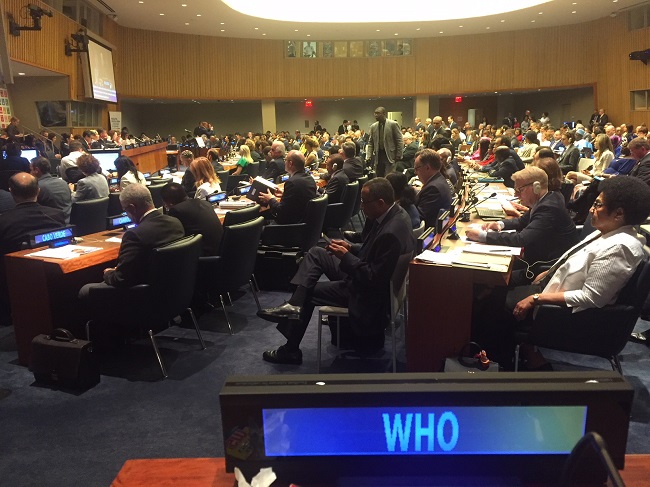
The 2018 High-Level Political Forum (HLPF) was convened under the auspices of the UN Economic and Social Council (ECOSOC) and was held at the United Nations Headquarters, New York from Monday, 9 July to Thursday, 19 July 2018 on the theme “Transformation towards sustainable and resilient societies”. WHO cosponsored seven side events including on water and sanitation, food safety and nutrition and on antimicrobial resistance. WHO also participated in the overall proceedings of the meeting and other health related side events at the Forum.
During the first week, thematic reviews took place on the overall progress of the 2030 Agenda, with priority given to 6 out of the 17 SDGs: SDG 6 Clean water and sanitation; SDG 7 Affordable and clean energy; SDG 11 Sustainable cities and communities; SDG 12 Responsible consumption and production; SDG 15 Life on land; and SDG 17 Partnerships for the goals. Participants discussed challenges associated with implementing the SDGs including climate change and conflict zones; inadequate social protection; the rise of hunger; gender inequality; pressures on land, forests, and livelihoods; an overall decrease in global official development assistance (ODA); and underfunding of data collection for SDGs in developing countries.
The second week of the Forum was dedicated to the high-level ministerial segment, with over 55 Ministers in attendance and 46 countries presenting their National Reviews (VNRs) on progress and challenges in implementing the SDGs, in panels and individual presentations.
Main discussions revolved around the implementation of the 2030 Agenda, its future directions, and included some specific discussions regarding topics such as the positive and negative impacts of emerging technologies. Several speakers also highlighted the linkages between the health SDG and the SDGs being reviewed, stressing on the importance of coherence among the goals to ensure effective implementation of the 2030 Agenda.
A total of 190 side events were organized during the two weeks of HLPF, including WHO co-sponsored and other health-related events, planned and attended by WHO.
WHO CO-SPONSORED SIDE EVENTS:
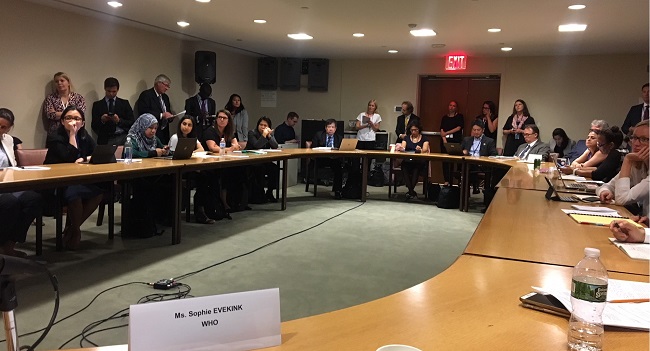
Water and Sanitation Safety Plans
Monday, 9 July 2018, 1:15 - 2:30 PM
Hosts: Permanent Missions of Finland and Vietnam; Co-Sponsor: WHO
The seminar, with strong participation from the private sector and the UN system, highlighted the necessity for access to safe water including the implications for health, and for continuous water supply in urban areas. Discussions were led based on the successful public-private sector partnership that enabled the Finnish-developed Water Safety Plan (WSP) which aimed to reduce water supply risks and implemented in various cities in Vietnam. The side event showcased Vietnam’s progress towards the SDGs 6.1 and 6.2 and enforced the positive impact effective private and public cooperation could have on achieving the 2030 Agenda. Sophie Evekink, Technical Officer at the WHO office at the UN spoke at the event, highlighting WHO’s work and experiences in addressing the challenges in risk management in water supply and sanitation, and on the linkages between SDG6 and SDG3.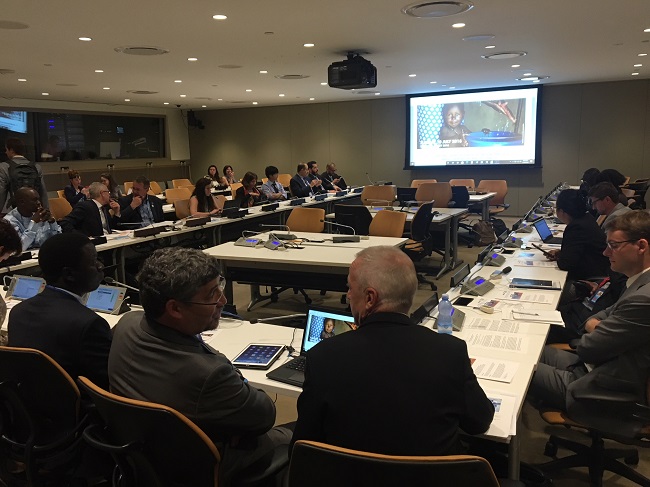
Monday, 9 July 2018, 1:30 - 2:30 PM
Host: Permanent Mission of Fiji (On Behalf of the Group of Friends on Drowning Prevention), Co-Sponsors: WHO
In 2015, an estimated 360 000 people died from drowning, making drowning a major public health problem worldwide. All regions of the world are affected by this silent killer and yet, over 90% of drowning deaths occur in low and middle income countries. This side event was aimed to address this silent killer and to promote sustained efforts towards drowning prevention. Werner Obermeyer, Deputy Director, WHO office at the UN participated in the discussions with key representatives from member states, UN agencies and civil societies addressing key risk factors associated with this issue. The purpose of the session was to raise awareness about drowning and ultimately to develop and communicate about the useful solutions that could make this global killer preventable.
Water Education as the Vehicle to Achieve SDG 6A
Monday, 9 July 2018, 6:30 - 8:00 PM
Hosts: IHE Delft Institute for Water Education, UNESCO, International Hydrological Programme (IHP);
Co-Sponsors: WHO, OECD; Supporting Countries: Governments of Senegal and El Salvador
This side event held discussions on topics such as investments in water education, closing the gap between supply and demand in water education, achievement of sustainable development through better monitoring of capacity-building and the assessment of the water-related curriculum based on the new generation’s needs. Furthermore, the lack of water education in advanced economies was also noted as the speakers believed that education, along with training, enlarged the spread of knowledge to provide new insights and techniques in achieving not only the SDG in focus but the 2030 Agenda as a whole. The outcome of discussion emphasized the need for a holistic approach and multi-sector cooperation as it would facilitate the link between SDG6a and SDG3 and noted that education is a quintessential platform for increased cooperation and knowledge sharing.
Driving Gains in Health and Nutrition through WASH
Tuesday, 10 July 2018, 6:30 - 8:00 PM
Host: Action Against Hunger; Co-Sponsors: WHO, Government of France, Government of Mali, Government of Zambia, Global Taskforce on Cholera Control, UNICEF, World Bank, Scaling Up Nutrition (SUN), Sanitation and Water for All (SWA), WaterAid, Save the Children, French Water Partnership
This side event’s objective was to provide a platform for government and UN representatives to share lessons learnt and discuss challenges on the topics of water and sanitation (WASH), Health and Nutrition through a peer-learning experience. Participants stressed the need to foster a multi-sector coordination and cooperation to align and harmonize efforts in achieving progress towards SDGs 2, 3 and 6. Dr. Dominique Legros of the Cholera Team at WHO participated in the panel, stressing the importance of WASH in healthcare facilities in cholera hotspot communities, and highlighting that WHO and UNICEF are working on a global response and campaign in regards to the SG’s Call to Action.
Safe Food for Sustainable and Resilient Societies
Thursday, 12 July 2018, 6:30 - 8:00 PM
Host: Permanent Mission of Costa Rica; Co-Sponsor: WHO and FAO
Multi-sectorial representatives took part in the panel discussion that shared experiences, discussed national examples the benefits of high food safety standards to consumer health and provided recommendations on how everyone could contribute to ensuring that our food remains safe for consumption. The overall discussions revolved around the creation of sustainable and resilient societies, by reducing acute and chronic foodborne illness, ensuring food security to everyone, mitigating harmful environmental impacts caused by food production, and supporting fair and transparent food trade. Werner Obermeyer, Deputy Director, WHO office at the UN represented WHO at the event.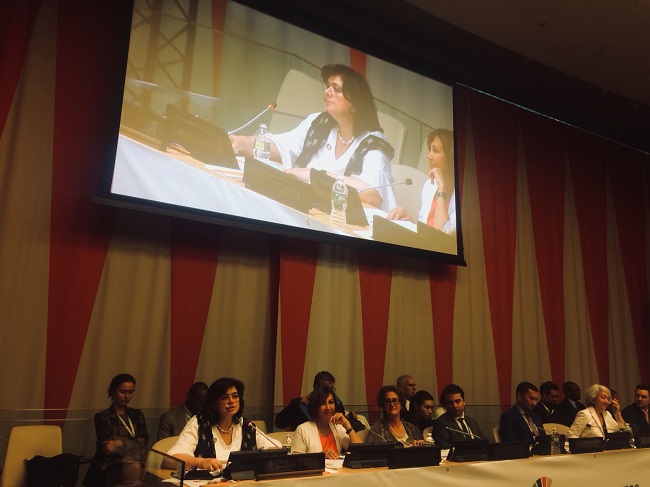
Strategic Partnership between the Russian Federation and the UN
Tuesday, 17 July 2018, 1:15 - 2:30 PM
Host: Russian Federation; Co-Sponsors: WHO, UNDP, UNFPA, UNOPS
This side event focused on the areas of increased strategic partnership and cooperation between the Russian Federation and United Nations agencies, in regards to the 2030 Agenda and the SDGs in focus. Directors and other representatives of 10 UN agencies presented the ongoing work of UN agencies in the health areas such as tuberculosis, non-communicable diseases, children and maternal health, water and sanitation, food security among many others. The outcome of the event restated the Russian Federation’s strong commitment to financing and supporting United Nations’ work, with key priority areas of health, education, trade and industrialization. Dr. Menabde, Executive Director, WHO office at the UN, highlighted Russia’s collaboration with WHO on a number of health issues, in particular NCDs, road safety, TB, and health emergencies.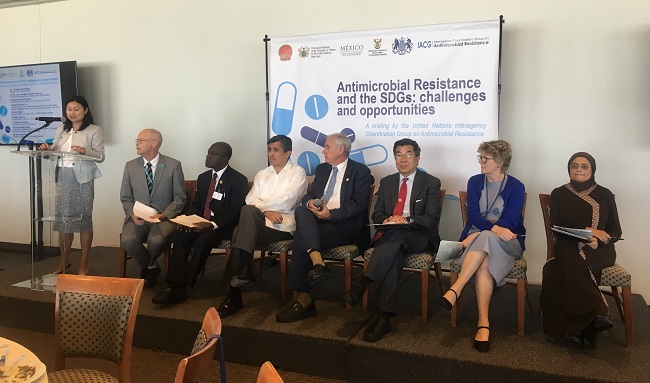
Briefing and Discussion with the Interagency Coordination Group on Antimicrobial Resistance
Wednesday, 18 July 2018, 1:15 - 2:45 PM
Host: IACG on AMR; Co-Sponsors: Permanent Missions of the United Kingdom, China, Ghana, Mexico, and South Africa
The main objective of the meeting was to discuss the challenges and opportunities related to antimicrobial resistance (AMR) and the Sustainable Development Goals (SDGs) in the context of human, animal, plant health and the environment. The briefing was also intended to provide update on the progress of the ongoing work of the IACG. The meeting was attended by participants from government, diplomatic missions, civil society organizations and the private sector. Throughout the discussion, panelists from member states, academic institutions, UN agencies, and IACG covered a wide range of AMR related issues, with six key areas being raised for its global profile: Communication and awareness; National action plans; Optimization when it comes to the use of antimicrobials; Innovation/R&D; Surveillance and monitoring; and Governance/SDG alignment.
Haileyesus Getahun, the coordinator of the IACG Secretariat, also presented on the current status and next steps of the IACG and called on stakeholders to actively engage in the public consultation processes of the group. Stakeholders agreed that all parties must consistently share inputs and take required measures to create opportunities to engage all sectors in AMR related work. Given the numerous participants from member states and UN agencies, it was clear that issues related to AMR continuously remain vital and universal.
OTHER SIDE EVENTS:
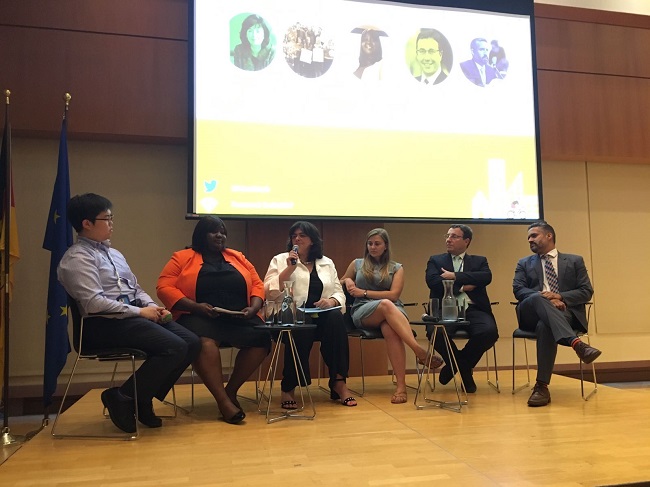
Various other side events of great interest were attended by WHO during the HLPF due to their health and SDG 3 oriented programme. The range of key topics discussed during these side events included: Newborn and maternal health; Mental health; Persons with disabilities; Ageing population; Road safety; Sanitation and hygiene management; and Health education. Dr. Menabde Executive Director, WHO office at the UN also participated alongside UNDP Administrator Achim Steiner in an event organized by Youth Delegates at the German Mission on the theme of sustainable urban mobility highlighting the importance of health and wellbeing in urban planning and mobility.
The Forum culminated with the adoption of a Ministerial Declaration by Member States reaffirming their commitment to effectively implement the 2030 Agenda for Sustainable Development for all people, everywhere.
